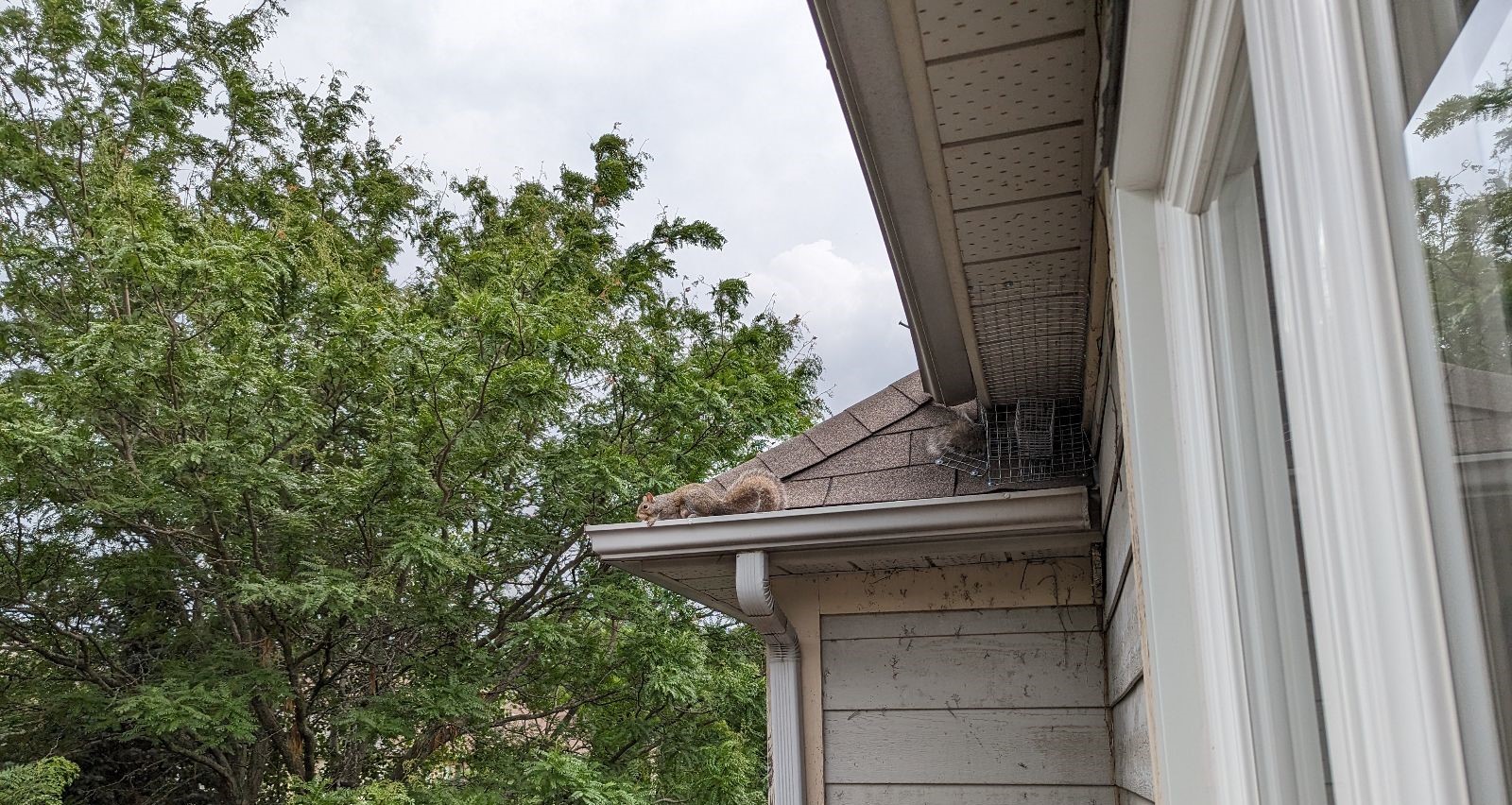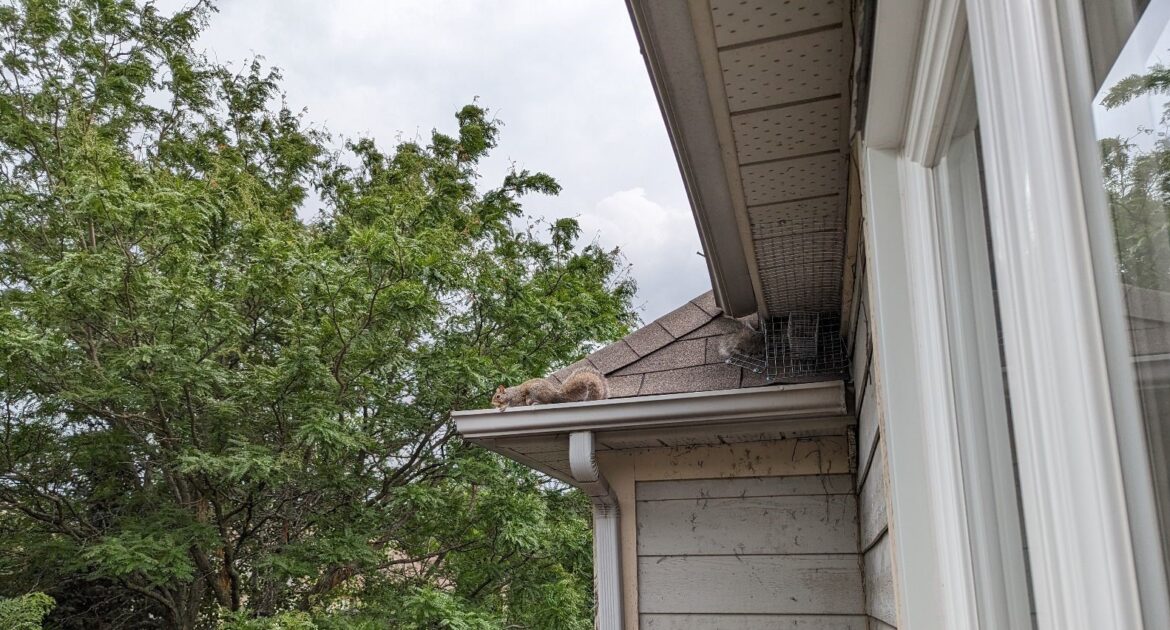Squirrels might look harmless as they scamper around your yard, but when they slip into your home, the problems they create can be anything but cute. Allowing squirrels to stay and ignoring the signs of an infestation could lead to costly and even dangerous consequences. From structural issues to the risk of fires and serious health concerns, the damage they cause can quickly add up if left unchecked.
When squirrels invade, they chew through walls, wires, and insulation, threatening your home’s structural integrity. Their droppings and urine can bring harmful bacteria into your living space, lowering your home’s air quality. Without proper wildlife infestation management, these problems don’t just go away—they get worse. That’s why squirrel damage prevention is so important for keeping your home safe and healthy.
At Skedaddle Humane Wildlife Control in Hennepin County, we understand the urgency of tackling squirrel infestations head-on. This guide covers what happens when squirrel problems are ignored and what steps you can take to protect your home before the damage spirals out of control.
Structural Damage to Your Home
Squirrels are avid chewers. It’s how they keep their teeth sharp and healthy. Unfortunately, when they decide to chew their way through your roof, attic, and walls, they leave behind a trail of destruction that can cost you big time.
Here are a few ways squirrels can cause structural damage to your home:
- Rip through wood and chew holes into insulation, leaving entry points in your home.
- Use insulation materials to build nests, creating bare spots that affect your home’s heating and cooling efficiency.
- Chew on electrical wires, leading to serious problems like electrical shorts or fire hazards.
The longer you ignore these issues, the more damage accumulates. Over time, damaged insulation or weakened wood can harm the structural integrity of your home. What could have been a quick fix may soon turn into expensive repairs, such as:
- Roof patches.
- Rewiring electrical systems.
- Replacing damaged structural components.
It’s much easier (and cheaper) to take action early than to deal with extensive repairs down the road.
Fire Hazards from Chewed Wires
One of the most dangerous consequences of having squirrels in your home is their tendency to gnaw on electrical wiring. The plastic coating on wires seems to be a favorite material for squirrels, and once they chew through it, they expose the copper inside.
Exposed wires can result in:
- Electrical shorts.
- Sparks.
- Fires, which endanger your family’s safety and home.
Repairing electrical damage caused by squirrels can be costly and must be handled by licensed electricians to ensure safety. If wires are left exposed for too long, issues like flickering lights or tripped breakers could signal a much larger problem.
Regular wildlife infestation management can help you catch problems like this early. Handling squirrel damage prevention now is always better than waiting for a much more dangerous situation to develop.
Contamination from Droppings and Urine
Squirrels don’t just chew things and leave nests behind. They also leave droppings and urine wherever they settle. Over time, this waste accumulates in your insulation or attic, contaminating the materials and even impacting the air inside your home.
Squirrel waste is more than just unpleasant. It can contain bacteria, parasites, or even mold. Over time, this can seep into your home’s air supply, potentially causing respiratory problems or allergic reactions for those who live in your home.
Cleaning up these messes isn’t as simple as it sounds. Professionals need to safely remove contaminated materials and disinfect the area to ensure any harmful organisms are eliminated. The longer the infestation is allowed to continue, the worse this problem becomes. Act quickly to keep both your home and your family healthy.
Infestation of Other Pests
When squirrels make themselves at home in your attic, they often bring other pests along with them. Fleas, mites, and ticks are frequent hitchhikers that thrive on squirrels. Once they’ve entered your home, these pests can find their way onto your pets, into your carpets, and even into your furniture.
These smaller pests may be harder to notice at first, but once their population starts to grow, they create serious discomfort for everyone in the house. Worse, some of these pests are known to spread diseases, multiplying the risks associated with untreated infestations.
Leaving a squirrel problem unaddressed could eventually mean an even bigger, more expensive extermination process. It’s another reason why dealing with pests right away is much more efficient and saves you money in the long run.
More Squirrels, More Problems
Squirrels are prolific breeders, especially when they’ve found a safe, warm environment like an attic. What starts as a single squirrel sneaking into your home can quickly escalate into a full-blown infestation.
Each new litter means more mouths to feed—and more damage done to your property. This creates a snowball effect as more squirrels multiply and the scale of destruction grows. Repairs that might have been needed in one corner of your attic could eventually creep into your walls, roof, and even electrical system.
Prevention is always easier than removal. Scheduling a professional inspection can help identify a new infestation before it has the chance to grow out of control.
How to Protect Against Squirrel Damage
While squirrel infestations can cause serious problems, there are steps you can take to protect your home. These prevention methods tackle common entry points and other conditions that make it easy for them to get inside.
- Seal Entry Points: Squirrels are excellent climbers and can squeeze through tight spaces. Make sure all attic vents, roof gaps, and chimneys are properly sealed. Using durable materials, like steel mesh, can help keep them from chewing their way in.
- Trim Tree Branches: Overhanging branches give squirrels easy access to your roof. Keep branches trimmed back so they’re at least six feet away from your home. This small step can make a big difference in keeping them out.
- Secure Food Sources: Make sure to use squirrel-proof bird feeders and keep garbage bins sealed tightly. Removing food sources discourages squirrels from hanging around your property in the first place.
- Install Deterrents: Motion-activated tools like lights or ultrasonic devices can scare off squirrels approaching your home. These can be helpful in preventing nesting.
- Schedule Regular Inspections: Experienced wildlife technicians can spot early signs of squirrel activity before a full-blown infestation develops. Scheduling regular inspections helps address problems early.
Protecting your home takes preparation, but it’s a lot easier than dealing with the aftermath of a long-term infestation.
Don’t Wait – Call Skedaddle Humane Wildlife Control Today
Squirrels might seem harmless, but when they infiltrate your home, they can create bigger problems than most people realize. Ignoring a squirrel infestation can lead to significant damage and serious safety risks for your family. From chewed-up insulation and wires to harmful bacteria in contaminated spaces, the effects of these tiny tenants aren’t something to brush off.
At Skedaddle Humane Wildlife Control in Minneapolis, we’re here to help. Our expertise in wildlife infestation management and squirrel damage prevention ensures your home stays safe and sound for years to come. Protecting your home’s structural integrity is critical, and by addressing squirrel problems early, you can avoid the unnecessary costs and stress of dealing with extensive repairs later on.
Don’t wait until the damage gets out of hand. Squirrels might be small, but the havoc they can wreak on your home is anything but. With expert squirrel damage prevention and careful care for your home’s structural integrity, Skedaddle Humane Wildlife Control in Hennepin County offers trusted wildlife infestation management solutions that work.
Protect your home today—contact us to request a quote or learn more about how we can help. We’re here to make sure your home is both squirrel-free and safe for your family.




